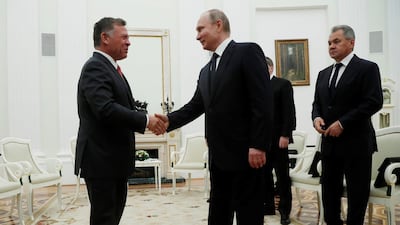King Abdullah of Jordan held talks with Russian President Vladimir Putin in Moscow on Thursday amid doubts about the fate of deal brokered with the US last year to reduce fighting in southern Syria.
The king said Jordan and Russia had achieved closer co-ordination on creating political conditions for the restoration of peace in the south of Syria but made no direct reference to the "de-escalation" deal in remarks reported by the Russian news agency Tass.
He said Russia was playing a leading role in the effort to end Syria's seven-year conflict and underscored the co-operation between their countries to stabilise the region.
"Of no less importance for the establishment of peace in Syria is the leadership you have demonstrated, co-operation of our two countries and our meeting last year," the king said, referring to his visit to Moscow in January last year.
King Abdullah's meeting with Mr Putin came a day after talks in Amman with visiting US Secretary of State Rex Tillerson, who also met members of the Syrian opposition in the wake of the peace summit hosted by Russia last month.
Jordan, Russia and the US reached a tentative agreement to end fighting in south-western Syria in July last year and finalised the details in November. It includes Deraa near the Jordan border and Quneitra near the border with Israel, and stipulates that foreign militias in Syria remain at least 40 kilometres away from these borders.
Unlike three other regions covered by similar "de-escalation" agreements — but without US involvement — the truce in southern Syria seems to be largely holding despite violations by the regime, even though the deadline to renew it was missed on February 10.
Jordan and Israel are anxious about Iran's expanding military presence in southern Syria and the presence of an ISIL affiliate that already controls at least 16 villages near their borders and is threatening to capture sizeable areas near Deraa city.
Iran has been building a military base in Izraa, a town in near the border with Jordan, since December. The Iranian Revolutionary Guard is also supporting a pro-regime militia in the town called Brigade 313 with weapons and money. The forces are deployed in Al Sanamayn, a city in southern Syria, and in the village of Qarfa.
Iran’s proxy forces continue to threaten the de-escalation efforts in southern Syria and the Jordanian military intelligence has been watching their activities closely. Although Russia, which is also a supporter of Syrian President Bashar Al Assad, is one of the three guarantors of the de-escalation agreement, analysts say it is not capable of reining in Iran.
_______________
Read more:
The Iranian militias fighting in Syria
US signs 5-year aid package with Jordan
Jordan and Russia agree on success of ceasefire in southern Syria
_______________
The expiry of the de-escalation agreement comes a few months after a CIA ended its programme to train, fund and arm rebels on the southern front.
Nicholas Heras, a security fellow at the Centre for a New American Security and senior analyst at the Jamestown Foundation, said the United States was acting like an absentee parent with the southern Syrian armed opposition.
Although the southwest de-escalation zone is one of the centrepieces of the Trump administration's new Syria strategy, and its only major play to affect the conflict in western Syria, it has paid surprisingly little attention to the day-to-day dynamics inside this zone, Mr Heras said.
“Under the Trump team's watch, the local ISIS affiliate Jaysh Khalid ibn Al Walid has expanded its area of control, and is threatening to capture sizeable areas on the doorstep of Deraa city. The Iranians and their Hezbollah network are expanding, not withdrawing, their presence in south-west Syria and are now the most powerful component of Bashar Al Assad's forces in this area," he said.
"The expansion of both ISIS and the IRGC in south-west Syria is a direct result of the Trump administration's lack of decisiveness in formulating policy towards this region, particularly its delay in deciding on whether to renew military support for the southern armed opposition."
Mr Heras said Mr Trump's team needed to decide if it wanted the de-escalation zone in south-west Syria to be stable or not, and if it was willing to invest the effort and attention necessary to accomplish that objective.
“By supporting already US-vetted elements of the south-west Syrian armed opposition, the Trump administration can begin to roll back ISIS, and work toward diminishing Iran in Syria, if it so chooses. The question is whether Washington wants to act or not in south-west Syria.”

